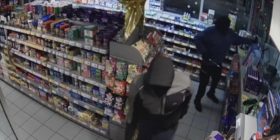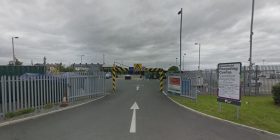Shotton: “You’re Seeing People Who Wouldn’t have been Struggling Before Who Now Need Help” – A Day in the Life of a Food Bank
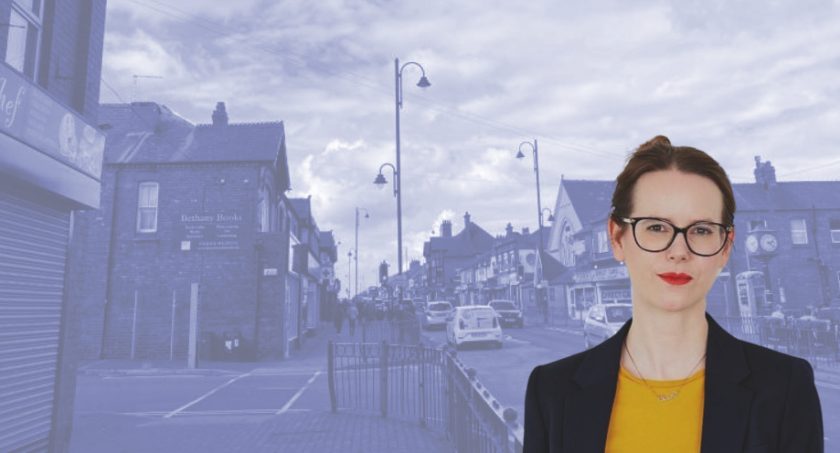
Journalist Sian Norris returned to Shotton where her family once lived to learn how the cost of living crisis is impacting the lives of ordinary people and their communities in north Wales.
The Chief European & Social Affairs Reporter at BylineTimes visited Shotton to understand how people are coping, she said “it was quite a journey.”
Sian, who visited on the day the Queen died, said she put everything into researching and writing the subsequent article, “it means a huge amount to me.”
Here is Sian’s account:
“You’re Seeing People Who Wouldn’t have been Struggling Before Who Now Need Help” – A Day in the Life of a Food Bank
It’s nearing the end of Shotton food bank’s opening hours when Ceri (not her real name) arrives. A young mum and cat-owner, dressed in trendy black jeans and a black top, she seems nervous. “I’ve never done this before,” she explains, scrolling through the emails on her phone to find her voucher. She’s smiling, but you can tell that beneath the smile are tears which, every now and again, swell in her eyes.
Steve, who has been volunteering at the local network of food banks for 10 years now, instantly puts her at ease. I ask her about her cat, who was recently ill, and we chat as Steve loads up her bags of basic food staples, along with a bag of cat food. She also gets a free SIM card. By the time she leaves, her smile is real, the tears are gone.
“We want to send people away with a smile,” Steve says. “So they leave feeling more confident than when they came in. We want them to feel they have been to a nice place”.
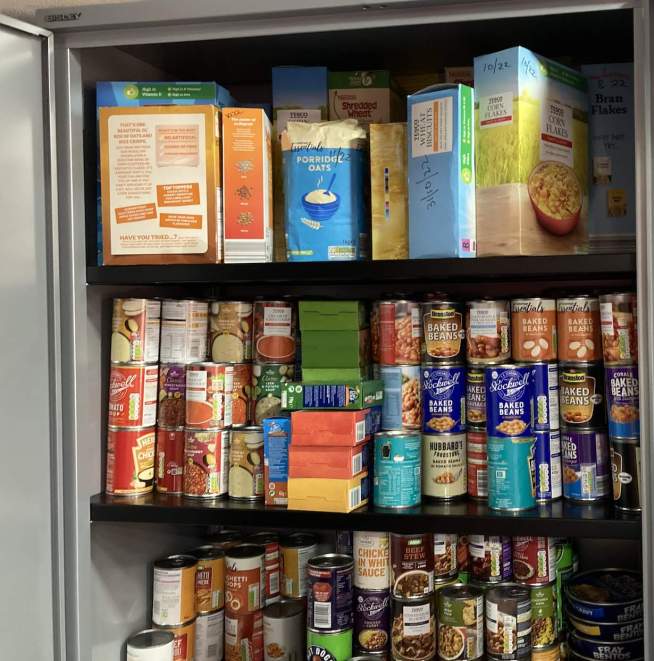
Full cupboards at Shotton’s food bank. Photo: Sian Norris
It’s a busy day at the food bank but not, Steve tells me, as busy as last week – “11 people in the first half-hour,” he says. The school holidays were quieter, explains Sandra, who runs the centre.
Not because people aren’t in need. But because they don’t want the children to know.
It’s the first time I’ve been to Shotton, a small town in Flintshire, North Wales, for a year. Last time I was here was for my nana’s funeral – she had lived here since she moved as a child from South Wales, getting married, raising a family, and then her and granddad spending almost half their lives on the old people’s estate where she worked as a warden, before they retired and became residents themselves. My granddad worked at the iconic steelworks until the redundancies during the Thatcher era, becoming a delivery driver after that.
Every summer for about 10 years, until I was a teenager, we would come up to Shotton to visit for a week, before heading to the North West of England to see my paternal grandparents for a second week, and then to my dad’s sister in the North East for a third week. That is how I remember my childhood summer holidays: my brother and I as two little parcels, delivered to relatives waiting at service stations.
What I remember of Shotton is playing bingo in the old people’s centre; my granddad singing on the piano in the centre; watching Dogtanian and the Three Muskahounds on VHS; visiting my nana’s sister and her husband who kept racing pigeons; going to the woods where granddad would tell us stories about goblins.
Before arriving at the food bank, I take a walk around Shotton, up towards the estate where nana and granddad lived. The high street is buzzing, and I’m struck by a memory of going to a shop as a child full of odds and ends, and buying some cheap porcelain opera masks decorated with glitter and feathers.
The shop is still there, as are various cafes and pubs where people are stopping for lunch, chatting about the breaking news of the day: the Queen is under medical supervision, by the time I arrive at a friend’s that evening, she will have died.
Semi-detached houses with nicely-kept driveways spread out of the centre, as I follow a wooded path towards Higher Shotton. Is this where we used to come, I wonder, on walks with granddad? Higher Shotton has the largest council estate in the county: when I was a kid, driving into the town, there was an abandoned council estate that had been compulsory purchased to allow for a road to be built, but the road didn’t get built, at least not back then, so there were just these ghost houses.
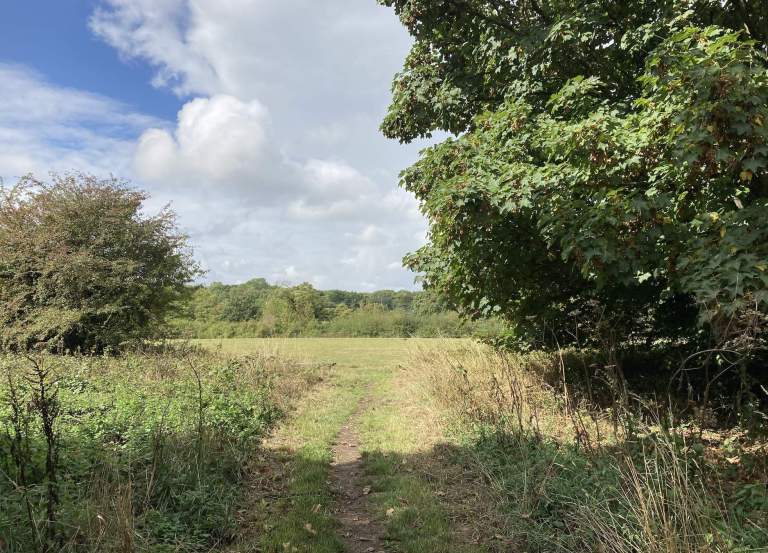
Taliesin. Photo: Sian Norris
Back at the food bank, and Kath has popped round to get her bags and for a chat. Steve and Sandra know her well, and the conversation covers everything from her health (not good) to her grandchildren (gifted colouring crayons from the food bank) and her best friend. I ask about her concerns about the winter, and the energy crisis. The anxiety she feels is written on her face.
“It’s not just the gas and electric, it’s the price of food, everything is going up,” she says. “It’s getting to the stage where I don’t put the gas on, I put an extra cardigan on if I get cold at night”.
Kath has a heart condition and arthritis, she needs to keep warm or the pain in her joints flares up. “I am dreading the winter,” she admits.
“We are thinking about how we can provide warm spaces,” says Andy Leake, a church minister and chair of trustees across the nine food banks across Flintshire. The banks are affiliated to the Trussell Trust. “Especially for lonely and isolated people, and elderly people who watch every penny and don’t want to turn the heating up. How can we be a place where people might not come for food, but can come for a natter and a cup of tea to warm up”.
“This is not a particularly deprived area, there are pockets of deprivation but we have done well to keep our industrial base and to maintain good manufacturing jobs,” Sean Bibby, the local councillor for Shotton West, tells me. He was walking past the food bank and Steve stopped him for a chat, introducing us. “But what we are seeing in the last few months are people we would not be expecting to be in difficulty suddenly finding themselves in a lot of difficulty. We’ve had a lot of people who have been really struggling and that number is increasing every day”.
Bibby’s assessment is borne out by the statistics: in Flintshire, 21.2% of children are living in low-income households, up from 15.8% the previous year. That’s a devastating increase, and it’s one being experienced by mums like Ceri.
The food bank itself is based in an old bingo hall that is in the process of being converted into a church. It’s in the hall itself where I sit down with Andy Leake. The space is extraordinary, painted in vibrant pinks and purples, a stage at the front and a disused bar in the corner. It feels like an old vaudeville music hall, all faded glamour.
“We thought if we fed 1,000 people in the first year, we’d be doing something,” Andy says. “We ended up feeding two and a half thousand people”.
The numbers are going up month by month. Andy hands me a piece of paper on which he has jotted down the figures for how often the food bank is being used by people in Shotton. Between 1 April 2021 and 8 September 2021, they were supporting 103 adults and 76 children, or 179 people in total. In the same period this year, the number had increased four-fold, to 484 low-income households – 283 adults and 201 children.
“We are here and we are helping people,” says Andy.
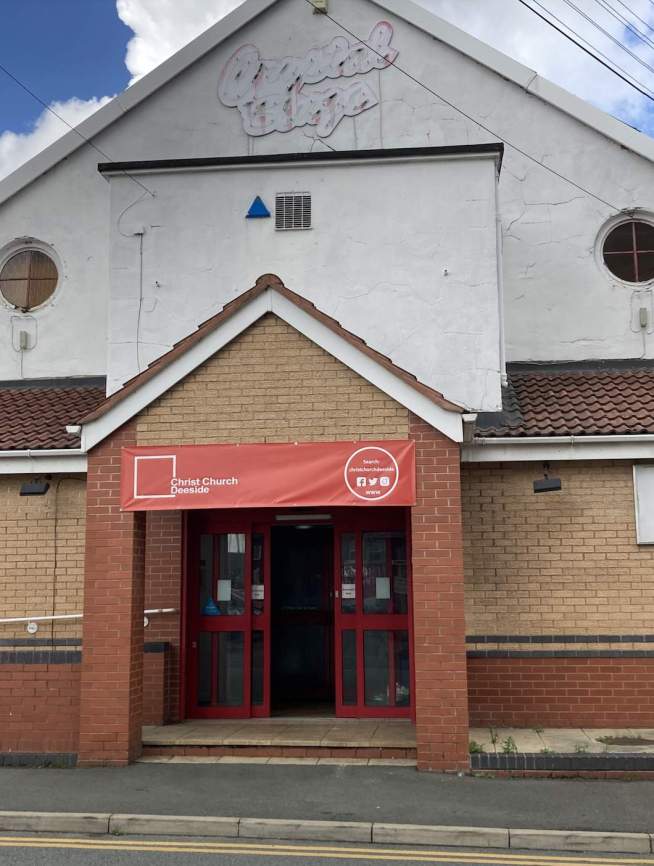
The food bank is located in a converted bingo hall, which is now a church. Photo: Sian Norris
The rising cost of living is clearly in part to blame for the increasing numbers of people in urgent need of support. But Andy also cites changes to the benefits system as pushing people into crisis. “We had a woman come in here who was sanctioned for missing a job centre appointment because she was doing volunteer work,” he explains. “They took all her money away. She was in floods of tears. We helped her, but I was horrified. It does nothing but demean the very human nature of that person”.
Sean Bibby also points to benefit changes as driving financial insecurity. “We’ve had changes to benefits, austerity, the rise of zero hour contracts,” he says. “It’s not just the financial impact on people, but it’s having an effect on people’s mental health”.
For Andy, mental health is also a concern. “I think there are a lot of people in this country who are economically vulnerable,” he says. “You realise how tender that vulnerability is, how it can make you lose sleep. It’s not pretty, it’s very distressing. I think we are going to have a major mental health crisis”.
Little wonder, then, that the food bank is increasingly signposting users to a wider range of local services, from homelessness support to advice on domestic abuse.
“To need to use a food bank, you need to be in a pretty tough place,” Andy explains. “But nonetheless, maybe food isn’t the real issue. It can be a symptom. If we can point a person to debt advice, or housing, or help with budgeting, or maybe someone is in an abusive relationship. We know people who have expertise and so you become part of a chain that wants to help that person, to see them thrive”.
As both Bibby and Leake identified, the cost of living crisis has changed the demographics of people coming into the food banks – mums like Ceri who were just about managing, but are now asking for help for the first time.
“You’re seeing people who wouldn’t have been struggling before, who have a nice house and a nice car, who now need help,” says Bibby. “As a society we are really seeing the gap between the haves and have-nots, and now there are an awful lot more have-nots”.
It’s often people who are in low-paid work who are the hardest to reach, not least because they have never had to claim benefits or ask for support before. This was the situation for a couple of the dads who had come in during my visit – men determined to look after their families, even if it meant asking for help.
“I’ve spoken to people who tell me how they hate it, they have always provided for their family before,” Andy tells me. “Sometimes you have to ask for help, and we have to appreciate how difficult that is. We hear a lot from people who have a sick child, or a sick partner”.
It’s nearly time for the food bank to close its doors, when a man in his early-40s rushes in, clutching a packet of Kenco coffee and looking in every pocket of his long coat for his phone. He’s forgotten it, and with it his code to access his bags of food, but Sandra has a solution. She takes his name – let’s call him John – and finds him on her system. John is chatty, he’s recently out of prison and clearly a bit of a charmer, he gives me a wink as he says goodbye, carrying his two bags, a free SIM card for when he finds his phone.
“No one gets judged, everyone is the same in our eyes,” says Steve, waving goodbye to John. “We get people struggling with addiction coming in, refugees from Ukraine, they are all people who need to eat and who need to be supported”.
That lack of judgement means a huge amount to Kath. “They’re understanding,” she says. “They don’t look down on you”.
It’s also something that clearly drives Andy and his determination to help those struggling in his local community.
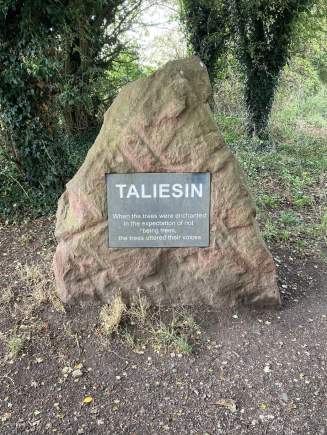
A bit of Welsh mythology at the entrance to the woods. Photo: Sian Norris
“This is about valuing people,” he tells me, his passion and love for people shining through in the darkness of the bingo hall. “I genuinely believe that people are the greatest resource that the planet has. And we hurt people so much by damaging them and disregarding them. What I am actually saying is that people need to be respected and honoured and cared for. So if I can care for someone else, and then that person cares for someone else, I’ve done a good thing”.
The sun has gone in, and a heavy rain shower pours down as I head to the train station and back across the border to England. I have never lived in the north, but whenever I am here there’s a feeling of home: thanks to the accents, everyone around sounds like my family.
When planning this trip to learn more about how the cost of living crisis was impacting people in North Wales, I emailed Ronald Davis, the local councillor, to ask for an interview. He told me that he knew my grandparents. “They were lovely people,” he wrote.
Thanks to Byline Times for allowing us to reproduce the article on Deeside.com.
You can read more stories written by Sian here: https://bylinetimes.com/author/siannorri/



